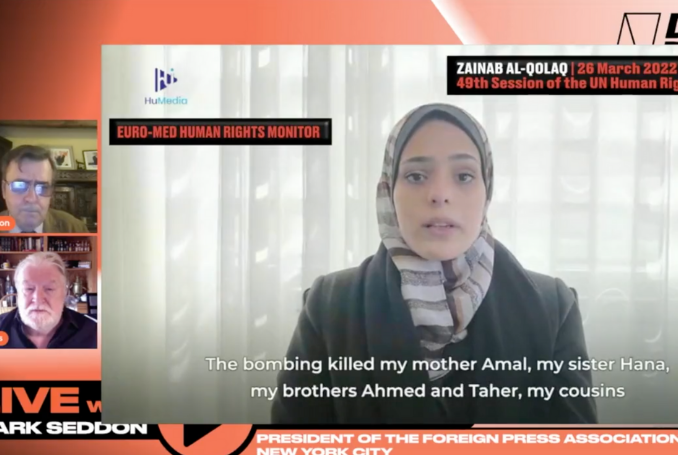
In a lively and illuminating discussion with Palestine Deep Dive (PDD), Mark Seddon and renowned journalist and President of the Foreign Press Association – New York City, Ian Williams, shine a light on the ongoing crises in Palestine and Ukraine.
The show titled “Occupation of Ukraine – Occupation of Palestine: International Law & the Cry for Consistency” pays special attention to exposing the hypocrisy of the global community when it comes to upholding the so-called “international rules-based” order.
Highlighting the creeping-prolonged injustice Palestinians have been exposed to, and how it has become normalized to those removed from it, Williams says:
“It’s like the frog in the pan as the water warms up and they don’t notice. It’s too late when its skin starts searing off. If you plunge the frog into the hot water, it tends to notice right away and jump… Of course, the Palestinians have noticed that their skin is falling off with the heat, but the rest of the world hasn’t because the rest of the world has gone along with it incrementally.”
Praising Ukrainian resistance, Williams ponders whether Palestinians would be in a better position had they received similar levels of Western support:
“I have to say that the Ukrainians surprised everyone with their resistance. Maybe if the Palestinians had been armed in 1967 and their governments had trusted them, then there might well have been a different ending… The real fact is that the Israelis have lied through their teeth for years and the West has chosen to believe them because the alternative, doing something about it, was too much. We’ve discussed the reason for that in this. There’s domestic lobbies, there’s geopolitical things.”
Expanding on the double standards in the Western response to Ukraine compared to Palestine, Seddon remarks:
“Of course, the Russian invasion was an absolute shock, not least to the Ukrainians, many of whom didn’t believe that it would happen, and part of their country is now being occupied… Of course, people in the West Bank, Jerusalem, Golan, which is an outright annexation, will say, well, hold on a minute, we’ve been occupied for 50 years, and if we start calling for sanctions, people say, oh no, you can’t call for sanctions and boycotts and divestments…”
Williams responds by arguing that Palestine advocates should be drawing parallels between Ukraine and Palestine wherever possible:
“Well, the worst thing we could do, or the Palestinians and their supporters could do, is to say, well, we are not interested because there’s no case there because we’re suffering. They should immediately try to associate at every level… These comparisons are invidious and must be made often over and over. The legalities are there. You hit upon it there. It’s indisputable for everyone concerned that the Golan was the acquisition of foreign territory by force”
Seddon was also keen to emphasize the duplicity of the corporate media:
“By the way, we don’t mind showing video footage of brave Ukrainians making Molotov cocktails, they’re freedom fighters, but if it comes to Palestinians making Molotov cocktails or Western Saharans, well, they’re terrorists. This grotesque double standards, isn’t it, really that sticks in a lot of people.”
Williams also expressed disappointment in Western media for its lack of meaningful reporting on Palestine:
“Most people have an infinite tolerance for the sufferings of others over a long period, and that’s what’s been happening with the Palestinians. The stuff doesn’t get into the media.”
Looking more closely at recent events at the United Nations, Seddon reported on Thursday’s United Nations Human Rights Committee vote supporting accountability for Israeli violations of Palestinian human rights in the occupied territories. The U.S. voted against it.
With UK and Ukraine abstaining, Seddon said it is, “disappointing given the fact that most Ukrainians, if they knew what was happening in Israel-Palestine, would immediately identify with the Palestinians.”
This week at the UN’s Human Rights Council, Zainab Al-Qolaq, a survivor of an Israeli airstrike on Gaza in May which killed 22 members of her family, delivered a speech asking the international community whether “real actions” will be taken to prevent similar atrocities from taking place.
Questioned whether he thinks the UNHRC will indeed take much notice of her powerful contribution, Williams responded: “It depends on the rest of us whether we keep it going.”
Seddon goes on to probe Williams on the reasons for today’s apparent lack of authority in institutions such as the International Criminal Court (ICC). Williams responds arguing the United States, by shielding Israel from legitimate accountability, has eroded the potential of such institutions in being a genuine force of authority:
“…there is no doubt whatsoever that the US defense of Israel at all costs over the years has led to a profound deterioration of international human rights mechanisms. The fact that anytime action is taken, the US springs up regardless of the facts to defend Israel, means that everybody else in the world say, “If not Israel, then why them.” If you don’t get Netanyahu, why you’re getting Milošević. It has allowed every crook genocidal maniac and kleptomaniac in the world to get out of jail free card or get out of jail cheap card because, if Israel can do it, so can we.”
He also emphasized Biden’s continuation of many of Trump’s policies over Palestine and beyond:
“There’s the US, as you say, it denounced Putin, said he’s a war criminal, but they still– Joe Biden still maintains Trump’s sanctions against the International Criminal Court justices. They’re not allowed in America, and why is that? Israel.”
Ending the show with a rousing call for meaningful action by state actors against Israeli apartheid and ongoing human rights violations against Palestinians, Williams declares:
“We should be calling for government sanctions against Israel until it abides by international law… Sanctions is the way to go. That’s how it worked with South Africa.”
(Palestine Deep Dive)







